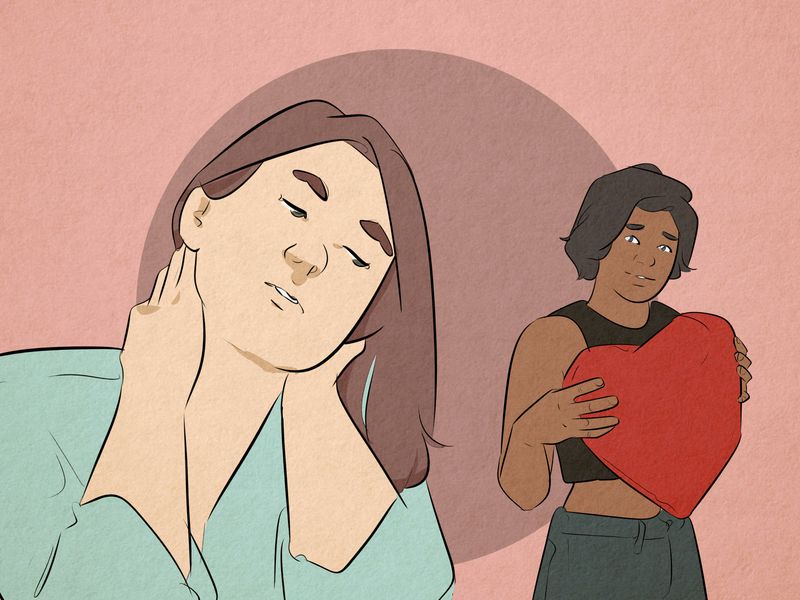16 Subtle Signs You’re Putting Everyone Else First
Let’s be brutally honest for a second. If you landed here, you already know how it feels to be tired—maybe not just physically, but that bone-deep kind of tired that comes from taking care of everyone except yourself.
Sometimes, it’s loud, like canceling your plans for someone else’s emergency. Other times, it’s so quiet you barely notice it—like apologizing for existing or saying “yes” when your insides scream “stop.”
This is the list you might wish someone handed you years ago when you kept confusing kindness with self-erasure. If you see yourself in any of these, it doesn’t mean you’re broken. It means you’re ready for a different story.
Let’s call out the small betrayals we do to ourselves, so maybe, next time, you pause before shrinking your own needs.
1. You Agree Before You Even Think

Ever find yourself nodding in agreement before your brain catches up? You might do this at work, at home, even with strangers at the grocery store. A friend asks for a ride, and your mouth says “of course,” but your mind just groans.
Somewhere along the way, your reflex became automatic approval. It’s not that you like being agreeable—it’s that saying “no” feels impossible. The weight of disappointing someone presses heavier than your own exhaustion.
If you answer yes before you even check in with yourself, it’s not just people-pleasing. It’s a pattern of skipping your own needs. The hard part? Most people don’t even notice you’re doing it. They just see someone easygoing, not the tightrope walk happening inside you.
2. You Apologize For Everything, Even Breathing

There might be a week where you apologize so often, someone could keep a tally. Spoiler: you’d hit double digits before lunch. It doesn’t matter if you spill coffee or just walk into a room—you say sorry like it’s punctuation.
This isn’t about being polite. It’s about shrinking, making yourself smaller so no one ever feels bothered by you. The apologies aren’t for your mistakes; they’re for your existence.
If you catch yourself muttering “sorry” every hour, ask yourself: Who are you trying to protect? Because most people don’t notice the little things. But you? You notice everything, and you carry it all.
3. You Feel Guilty When You Do Something For Yourself

Buying yourself a pastry can feel like some wild act of rebellion. You sneak it, then eat it quickly—hoping nobody notices. If you splurge on yourself, the guilt might show up before the receipt even prints.
Some days, self-care feels selfish. The mental checklist runs through all the things you “should” be doing for someone else. Rest becomes a luxury you think you haven’t earned.
That guilt isn’t a character trait; it’s a warning. When taking care of yourself feels wrong, you’re not just tired—you’re disappearing. Remember, you deserve time, treats, and space without apologizing for them.
4. You’re The Backup Plan—Always

I used to joke that my middle name was “Plan B.” Friends canceled, partners forgot, family improvised—I’d step in. It wasn’t heroic; it was habit. They knew I’d rearrange my life to fill any gap.
The truth? Being everyone’s safety net leaves you tangled in their chaos. It’s a quiet ache—knowing you’re chosen only when someone else drops the ball. Even when you needed support, you never wanted to be anyone’s backup.
If your phone lights up only when plans fall apart, you’re not just reliable. You’re the fallback, and it’s draining. Your time matters just as much as theirs.
5. You Avoid Conflict Like It’s Fire

You can sense an argument brewing from a mile away. Your instinct? Change the subject, lighten the mood, nod along—anything but face the friction. The idea of someone upset with you can make your skin crawl.
It’s not just discomfort. It’s this urge to smooth every wrinkle, even if it means swallowing what you really think. People assume you’re flexible. They don’t see how your opinions pile up, unsaid, heavy as bricks.
If you dodge conflicts until your jaw hurts from clenching words, you’re not only avoiding fights. You’re losing pieces of yourself, one silence at a time.
6. You Worry About Everyone Else’s Mood

At gatherings, you might play emotional weather reporter. Is someone tense? Does a friend seem off? You adjust your own mood like a thermostat, always hoping to keep things sunny.
It’s exhausting, trying to manage everyone else’s happiness. You end up ignoring your own feelings. Your antenna is so tuned to others, you forget what your own storm feels like.
If you leave gatherings more tired than when you arrived, check whose emotions you’re carrying. Sometimes, you’re soaking up rain that was never yours to begin with.
7. You Can’t Remember The Last Time You Made A Decision Just For You

Ever stare at a restaurant menu and ask, “What are you having?” before you even look at the options? You defer every little choice—movies, food, plans—to someone else’s preference.
At some point, you forget what you actually like. Decisions feel paralyzing, like there’s a right answer hidden in someone else’s approval. You think you’re being easy. Really, you’re erasing your own voice.
If you can’t recall the last decision you made without factoring in someone else, it’s not indecision. It’s self-abandonment, one small choice at a time.
8. You Overextend Yourself Until You’re Empty

You might pull all-nighters for someone else’s project, volunteer for every committee, say yes even when you’re supposed to rest. Your calendar looks impressive. Your face? Not so much.
Busyness becomes a badge of honor. But underneath, you feel hollow—a shell running on obligation and caffeine. You lose track of when you actually felt rested or fulfilled.
If you’re running on empty for a cause that isn’t yours, that’s not dedication. That’s depletion. You can’t fill other people’s cups if yours is bone dry.
9. You Fish For Permission To Have Needs

You ask, “Is it okay if I…?” for the tiniest requests—time off, help, even a break. You act like your basic needs need a permission slip from someone else. You want to be easy, low-maintenance—never an inconvenience.
It makes you invisible. The more you downplay your needs, the less anyone notices them. You teach people to overlook you by showing them it’s normal.
If you’re waiting for a green light to take up space, stop. Your needs are valid, even if you’re the only one who sees them.
10. You’re The Emotional Dumping Ground

People come to you with every crisis, big and small. You become everyone’s free therapist, even when your own mind is a mess. Their secrets, heartaches, and rants crowd out your own thoughts.
You think it means you’re trustworthy. But after every “just need to vent,” you feel heavier—like you’re carrying bags that don’t belong to you. Empathy turns to exhaustion.
If your phone lights up only for emotional emergencies, it’s not just kindness. It’s a red flag that your own boundaries are being trampled. You’re allowed to save some energy for yourself.
11. You Downplay Accomplishments

You joke away every compliment. Got a promotion? “Just lucky.” Finished a tough project? “It was nothing.” You shrink your achievements down to crumbs so nobody thinks you’re bragging.
Sometimes you do it to avoid envy, but mostly it’s fear. What if people expect more? What if your success makes them uncomfortable? Hiding feels safer than shining.
If you trade pride for modesty every time, pause. You’re allowed to take up space with your wins. Don’t stuff your brilliance in a corner to keep others comfortable.
12. You Say Yes Because You’re Afraid Of The Fallout

The word “yes” becomes your default, not because you want something, but because you fear what will happen if you say no. Maybe they’ll be mad. Maybe they’ll leave. Maybe they’ll talk about you.
Fear isn’t a healthy reason to do anything, but it’s powerful. It makes you pile on commitments you resent, just to avoid conflict or rejection. You think you’re keeping the peace. You’re just keeping yourself trapped.
If your yes comes from fear instead of choice, that’s not generosity. It’s self-defense. Your boundaries matter, even when they make other people uncomfortable.
13. You Disappear When You Need Help

When things get hard for you, you vanish. You don’t want to burden anyone. You think, “They have enough to worry about.” The urge to disappear becomes stronger than the urge to be seen.
It’s lonely. You become the friend everyone relies on, but you never call in your own favors. You think silence is strength, but really, it’s just isolation with a prettier name.
If you hide your struggles but show up for everyone else’s, that’s not independence. That’s self-neglect. Your vulnerability deserves as much care as theirs.
14. You Measure Your Worth By What You Give

You value yourself by how much you can give away—time, energy, attention, even your quiet. Your self-worth is tied to being useful. If you’re not helping, who are you?
It sounds noble, but it’s exhausting. You lose sight of who you are outside of service. When nobody needs anything, you feel empty, like you’re not enough on your own.
If your worth feels tied to your usefulness, remember: you’re more than what you offer. You’re allowed to receive, not just give. Even at your emptiest, you’re enough.
15. You’re Overly Attuned To Criticism

One sentence from a boss or friend can ruin your whole day. You replay every critique, real or imagined, like a broken record. Validation from others feels like air; criticism feels like drowning.
You bend over backward to avoid another negative word. The fear of disappointing someone keeps you guessing, adjusting, never settling into yourself.
If you’re hypersensitive to criticism, it doesn’t mean you’re weak. It means you’ve built your confidence on other people’s approval. You deserve to feel steady, even when others are stormy.
16. You Pretend You’re Fine (When You’re Not)

Nobody guesses when you’re falling apart. You wear “I’m fine” like armor—smile perfectly in place, jokes ready, never showing the cracks. It’s easier than explaining the mess inside.
Sometimes you wonder if anyone would notice if you stopped pretending. But you keep up the act, because being honest feels riskier than being invisible. Who would want to deal with your heaviness?
If you plaster on smiles but cry in the shower, you’re not alone. Pretending is lonely work. You deserve spaces where your truth isn’t something to hide.







